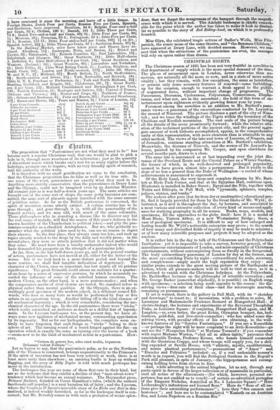thr Chtatrto.
The proposition that "Pantomimes are not what they used to be" has become such a regular Christmas wail, that one would be glad to pick a hole in it, through mere weariness of its reiteration ; just as the quantity of discordant music which breaks one's rest for so many nights before the holydays, prompts one to inquire, with no very friendly spirit of research, into the authority of the waits.
It is therefore with no small gratification we come to the conclusion, that the Christmas proposition has its false as well as its true side. In one sense of the word, pantomimes are exactly what they used to be. Anything more strictly conservative than the pantomimes at Drury Lane and the Olympic, could not be imagined even by an Austrian Minister. All remains just as it was half-a-dozen years ago. The same articles are brought out of the same sort of shops, the same petty larcenies are com- mitted, the same sort of placards appear inscribed with the same amount of pointless satire. As far as the British pantomime is concerned, the spirit of invention seems utterly extinct. A certain routine has to be gone through ; and gone through it is, with all the punctuality of the funeral service, and we may add, with much of the same solemnity. Those philosophers who in sounding a disease like to discover any but the real cause of malady, will find the source of this year's dulness in the known hostility of the Chamberlain to political jokes,—and pity the pan- tomime-compiler as a shackled Aristophanes. lint we, who perfectly re- member what the political jokes used to be, can see no reason to regret their absence. In the first place, they always came too late, and took up topics already worked to the dregs by the daily and weekly press ; in the second place, they were so utterly pointless that it did not matter when they came. He must have been a touchy ambassador indeed who would have demanded his passports on the strength of a pantomime joke.
As far, then, as the last half-dozen years go, and in the general routine of action, pantomimes have not moved at all, either for the better or the worse. But if we look back to a more distant period and beyond the mere routine, we shall find tangible indications of degeneracy. The character of the Clown, once so important, has lost nearly all its pristine significance. The great Grimaldi could amuse an audience for a quarter- of-an-hour by a series of expressive gestures, by which he accurately re- corded the influence of some of the subtilest human emotions. The modern Clown, on the other hand, is a mere posture-maker ; and when the comparative merits of rival clowns are tested, the standard refers to physical rather than mental qualities. At the Olympic, there is an ex- ceedingly good specimen of the modern school, in a debutant named Ed- wards; who does as many feats as would be performed by four or five artists in an equestrian troop. Another falling off is the total absence of all mechanical ingenuity ; which is very remarkable, considering the me- chanical character of the age. In the old pantomimes there were " tricks," which really astonished an audience as much as a skilful feat of legerde- main. In the Lyceum burlesques too, at the present day, we have al- ways some now appliance of mechanical means, commanding approbation by its ingenuity. But as for our harlequinades, the compilers seem en- tirely to have forgotten that such things as "tricks" belong to their sphere of art. The turning round of a board hinged against the flat—an operation which is exactly the same as turning over the leaves of a book —seems now to be the limit of mechanical action in a pantomime. How- ever,
"Cetera de genera hoc, adeo aunt mull; loquacem Delassare valent labium "- Let us hasten to say, that the pantomimic palm, as far as the Northern side of the Thames is concerned, belongs unquestionably to the Princess's. If the spirit of invention has not been very actively at work, there is at least more unity than elsewhere ; an amusing bustle is kept up without flagging, and the story of Billy Taylor is told with much grotesque hu- mour in the introduction.
The burlesques this year are none of them first-rate in their kind, but are so far welcome that they exhibit a decline of that "man-about-town" tendency which had become an annual nuisance. The Haymarket piece, Princess Radiant, founded on Count Hamilton's tales, (which the authors facetiously call popular,) is a neat harmless bit of faery ; and the Lyceum, where the Countess D'Anois's miserable story of La Bielie aux Bois is dra- matized, is indeed weakly furnished, as far as the burlesque itself is con- cerned; but Mr. Beverley comes in with such a profusion of scenic splen- dour, that we forget the meagreness of the banquet through the magnifi- cence with which it is served. The Adelphi burlesque is chiefly remark.. able for the pains which the author has taken to make it look as dissimi- lar as possible to the story of Red Riding-hood, on which it is professedly founded.


































 Previous page
Previous page